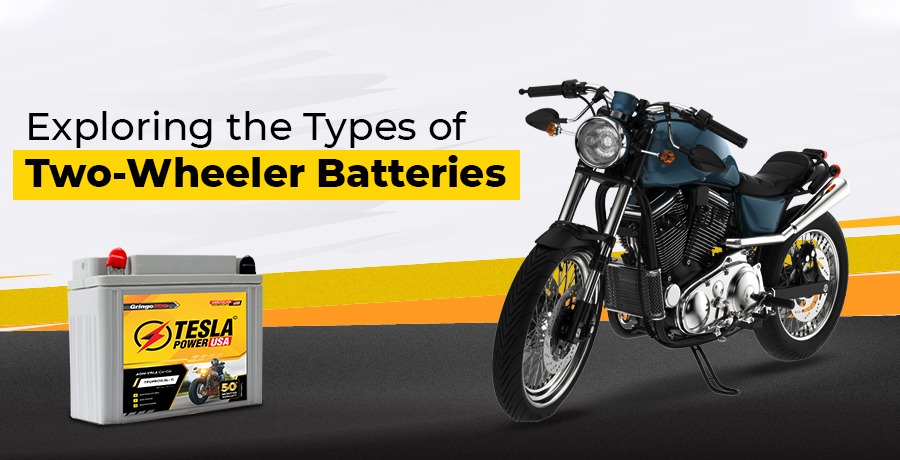Introduction
Two-wheeler batteries are an essential component of motorcycles and scooters, providing the necessary power to start the engine and operate various electrical systems. Choosing the right type of battery is crucial for ensuring your two-wheeler's reliability and performance. In this article, we will explore the different types of two-wheeler batteries available in the market and their characteristics.
1. Conventional Lead-Acid Batteries
Conventional lead-acid batteries have been the standard choice for two-wheelers for many years. They are a well-liked alternative because they are inexpensive and dependable. These batteries use a mixture of sulfuric acid and water as the electrolyte and lead plates to store and discharge electrical energy.
Advantages:
- Cost-effective
- Proven reliability
- Widely available
Disadvantages:
- Heavier compared to other battery types
- Require periodic maintenance, including topping up the electrolyte and checking for corrosion
2. Maintenance-Free (MF) Lead-Acid Batteries
Maintenance-free lead-acid batteries are an improved version of conventional lead-acid batteries. They are sealed, preventing the need for regular maintenance like topping up the electrolyte. This makes them more user-friendly and suitable for riders who prefer a hassle-free experience.
Advantages:
- No maintenance required
- Reliable starting power
- Affordable
Disadvantages:
- Heavier than some newer battery types
- Limited capacity compared to advanced options
3. Lithium-Ion Batteries
Lithium-ion batteries are a relatively recent innovation in two-wheeler battery technology. They offer significant advantages over lead-acid batteries, primarily in terms of weight, performance, and lifespan. Lithium-ion batteries use lithium as the primary material for energy storage.
Advantages:
- Lightweight, reducing overall vehicle weight
- Higher energy density for better performance
- Longer lifespan compared to lead-acid batteries
- Faster charging capabilities
Disadvantages:
- Higher initial cost
- Sensitive to overcharging and extreme temperatures
- Limited availability in some regions
4. Gel Cell Batteries
Gel cell batteries are a type of sealed lead-acid battery that uses a gel-like electrolyte instead of a liquid one. This design minimises the risk of acid leakage and corrosion, making them a safer option.
Advantages:
- Leak-proof and spill-proof
- Vibration-resistant
- Maintenance-free
Disadvantages:
- Lower cranking power compared to conventional lead-acid batteries
- Slightly more expensive
5. Absorbent Glass Mat (AGM) Batteries
AGM batteries are another sealed lead-acid battery variant. They use a fibreglass mat to hold the electrolyte, which enhances their performance and durability. AGM batteries are known for their ability to deliver high cranking power, making them an excellent choice for high-performance motorcycles.
Advantages:
- High cranking power
- Maintenance-free
- Leak-proof and vibration-resistant
Disadvantages:
- Slightly more expensive than conventional lead-acid batteries
Choosing the Right Battery
Selecting the right type of two-wheeler battery depends on your specific needs and preferences. When selecting a choice, keep the following things in mind:
- Budget: Determine how much you are willing to invest in a battery. Lithium-ion batteries are more expensive but offer better performance and longevity.
- Vehicle Type: The type of two-wheeler you own can influence your battery choice. High-performance motorcycles may benefit from AGM or lithium-ion batteries, while conventional lead-acid batteries suffice for daily commuters.
- Maintenance Preferences: If you prefer a hassle-free experience, maintenance-free batteries like MF lead-acid or AGM batteries are excellent choices.
- Climate: Consider the climate in your region. Some battery types, like lithium-ion, may be more sensitive to extreme temperatures.
Conclusion
Two-wheeler batteries are essential for starting your motorcycle or scooter and powering its electrical systems. Understanding the different types of batteries available will help you make an informed decision based on your specific requirements. Whether you opt for the affordability of lead-acid batteries, the reliability of AGM batteries, or the performance of lithium-ion batteries, choosing the right battery type ensures a smooth and trouble-free ride.






